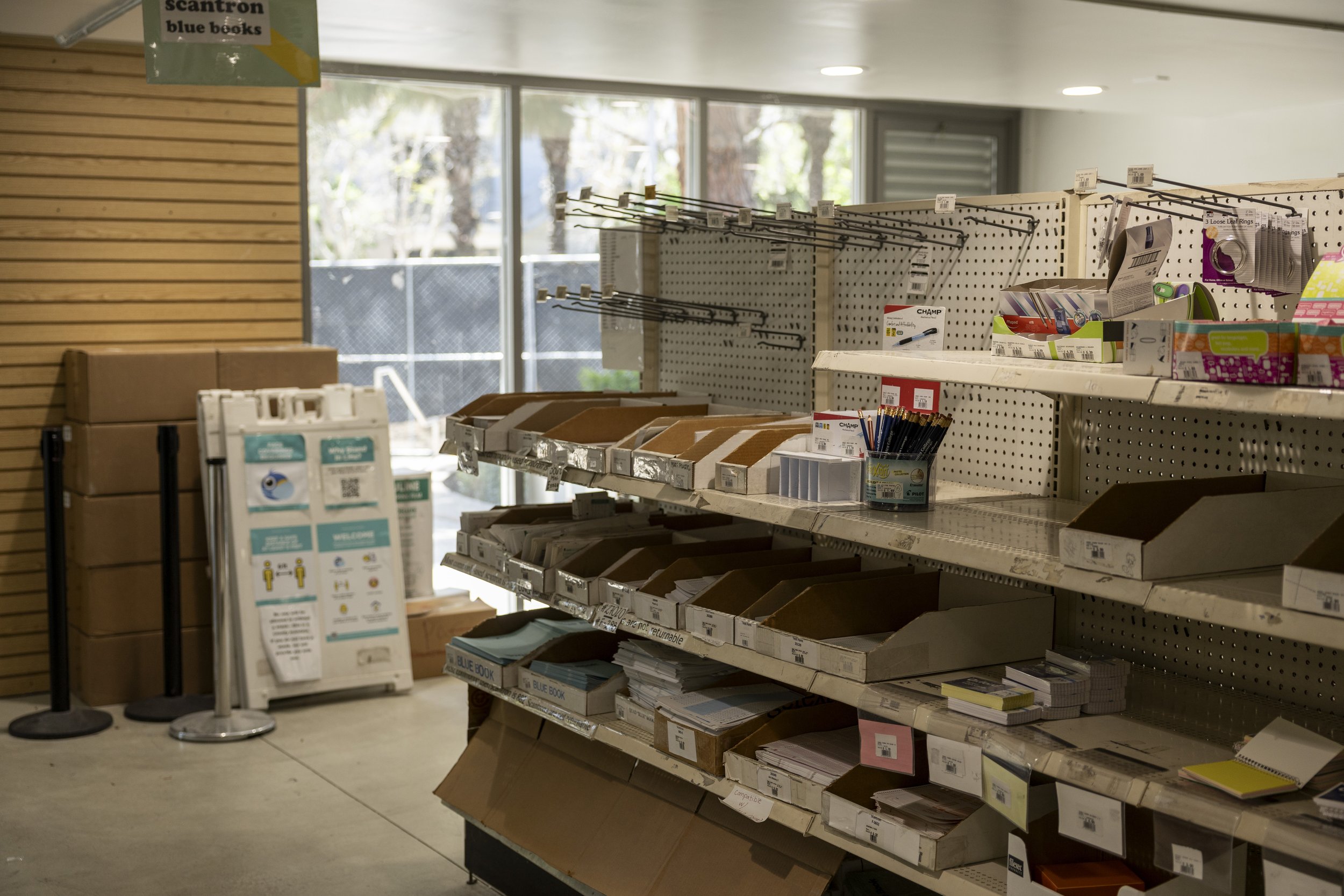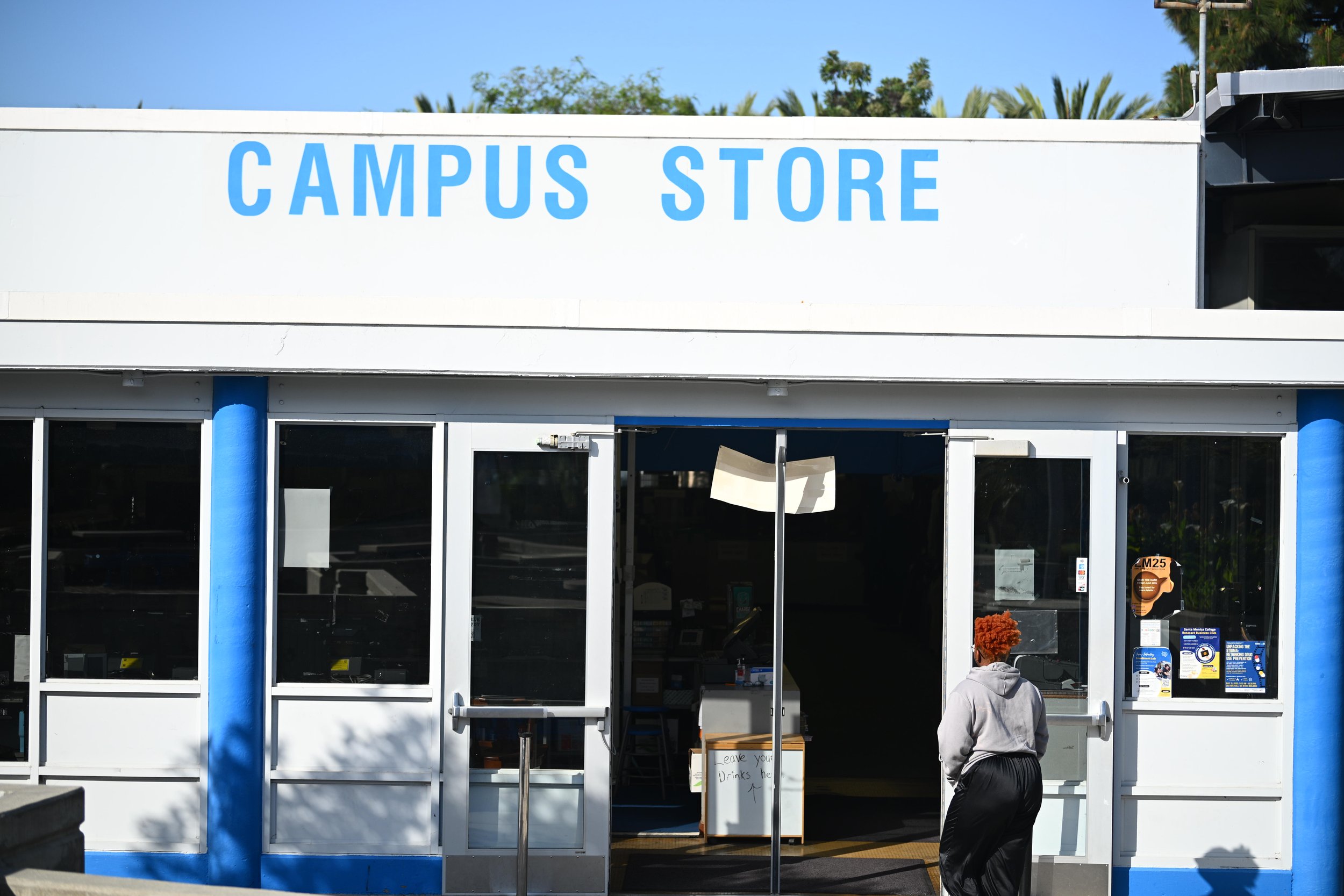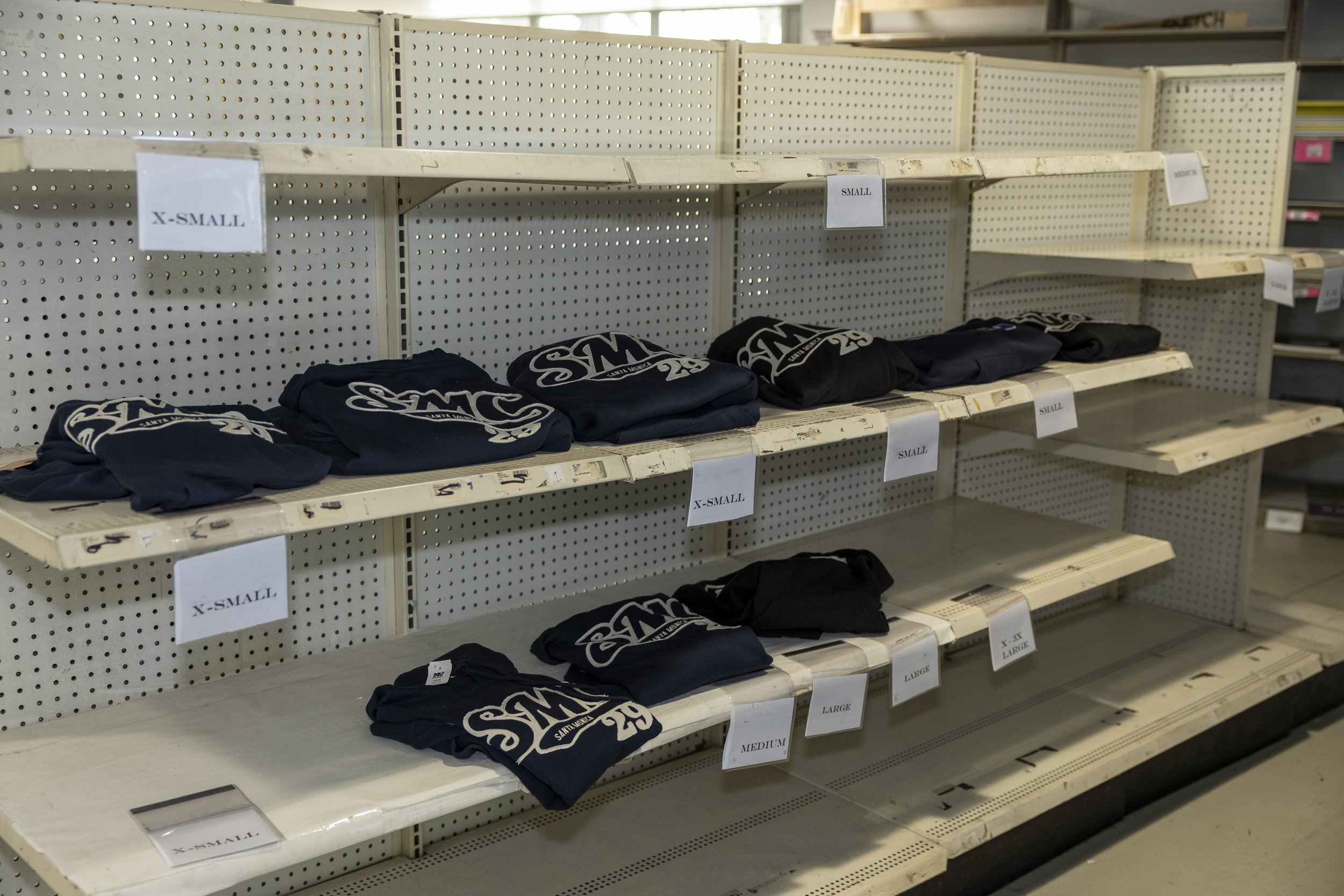Trustees tersely ratify new textbook system, amid bookstore renaissance





Budding chemists at Santa Monica College (SMC) are experimenting with the college’s new textbook system, before its campus wide institution this fall.
Students enrolled in chemistry classes this summer are piloting a textbook system in partnership with Slingshot, an education tech company. Students can pay a lump sum for their textbooks at $32 for every credit they’re enrolled in, purchase materials from Slingshot a la carte, or abstain entirely and buy their books elsewhere.
This system, emphasizing e-books and minimizing physical stock at the campus bookstore, hopes to counter low sales that haven’t yet bounced back after the pandemic. The bookstore used to take in $6 million in sales annually, dropping to $2 million in the 2023-24 fiscal year.
This materializes in yearly deficits of $1 million.
“We have been trying to hope that it would come back, and it just has not,” said Chris Bonvenuto, Vice President of Business and Administration.
“This is not a problem we face alone. We reached out to our fellow community colleges and find that everyone we talk to is facing the same issue.”
SMC’s Board of Trustees signed a five-year contract with Slingshot in May. The switch to Slingshot is a last resort against outsourcing all bookstore operations and closing the store entirely.
“The summer is a test period. This is new. We’re going to have hiccups, we’re going to have hurdles,” said Bonvenuto. “We’re dedicated to monitoring it on a minute-to-minute basis.”
Regarding student participation, “we’re forecasting at a 60% adoption rate. The vendors’ experience is they think it’ll be closer to 90%. We’re being much more conservative.”
SMC is the first college of 73 in the California Community College (CCC) system to partner with Slingshot.
“But there’s more than just course materials. Anyone who’s been in the store knows it’s pretty run down. It looks pretty awful,” said Mitch Heskel, dean of Educational Enterprise.
“I get requests from students all the time, ‘we need a place to hang out, especially after hours.’ So, we plan to develop a community space for students.”
Bookstore in need of repairs
The current state of the bookstore is universally agreed upon as grim.
“I went by the bookstore and it’s pretty disgusting,” said trustee Margaret Quiñones-Perez.
“On a regular day, it’s not as busy as one would imagine,” said Mir Javed, a student worker at the store.
Javed is a political science major and an international student from Pakistan. His favorite part of the job is interacting with customers; but the store is really only busy at the start of the semester, when students are stocking up on course materials.
“It (could) be more modern or competitive with another university bookstores,” he added.
The college is also questing to revamp the bookstore physically and keep it open until 9 p.m. on weeknights. A $100,000 grant paid out last year by Associated Students aims to refurbish the bookstore with new furniture, work stations and comfortable chairs.
When these renovations are finished, the bookstore is to be utilized for art exhibits, poetry readings, open mics, and concerts. And anytime the store is populated with students, there’s a chance they will purchase non-course materials, like merchandise, “which is where maybe we can make a little money,” said Heskel.
The Slingshot way
Slingshot is offering an All-Inclusive model, in which students pay a lump sum based on the amount of credits they’re enrolled in, at $32 per credit.
For participating students, the required materials for a four-unit physics lab would cost the same as the required materials for a four-unit English course, for instance. And a standard full-time courseload of 12 units would cost $384.
Participation is completely voluntary, but from now on, the campus bookstore will carry a “very limited” physical inventory and rely primarily on Slingshot’s outsourcing, according to Heskel. So students who relied on the bookstore might be compelled to resort to this new system, out of necessity.
Heskel acknowledged frustration with equating the cost of STEM and humanities courses. It was for this reason that he encouraged SMC to partner with Slingshot, a company he deems flexible for their “a la carte” option.
“In some courses, you don’t want that (All-Inclusive model). Like, English courses, a lot of books are five dollars. You wouldn’t want it, you can opt out. You can buy a la carte. The other vendors we looked at would not allow it. It was all or nothing.”
Slingshot’s a la carte prices, he said, are lower than most other retailers, including Amazon; and are “certainly lower than what we can offer now.”
A dying institution
Another asset unique to Slingshot is the company’s pledge to preserve all current bookstore staff, including seven full-time permanent employees, five seasonal temporary employees, and three student workers.
“I’ve been here since 2002,” said Elease Juarez, the bookstore’s manager. “When I started … we had close to 120 employees, because we had so many students coming in buying books.”
Juarez noticed the sharp decline in sales during the pandemic as students turned to e-books, and selling physical books was actually costing them. The solution, she thought, was to partner with a company that specialized in e-books, follow the trend, and collect some royalties for the store.
“It would be an overall win for everybody, for all of the students, for us,” she said. “We wouldn’t have to physically bring in the books, freight cost and so forth… It would be a lot easier for everyone.”
After the initial drop in sales, the bookstore was supported by the Higher Education Emergency Relief Fund (HEERF), money allocated by the federal government to support colleges in crisis during COVID-19. Once that money ran out, the store was kept afloat by auxiliary reserves.
By pillaging from reserves, the store managed to keep its doors open while losing business. The net cost of the Slingshot model is projected at $1.3 million. Under the model, Heskel and Bonvenuto expect the store’s losses to break even by year four.
Vouching for success
Heskel credits the bookstore’s deficits with fewer students on campus, competition from Amazon, direct sales from publishers, and students not knowing how to access book vouchers.
Programs like SMC Promise and Extended Opportunity Programs and Services (EOPS) allow some students to receive their course materials for free. Any student who graduates from a California high school and enrolls at SMC full-time in the same year is eligible for Promise, along with some exceptions for students with disabilities.
Starting this fall, under Slingshot, the company will apply these vouchers automatically and supply voucher students with materials, ideally before the first day of class.
To Heskel and Bonvenuto, improving the use of book vouchers is the most important goal of the partnership.
“A lot of (the vouchers) are not being used, which is a big problem, which is what this will address,” Heskel said. “There’s a lot of Promise money that hasn’t been used, and a lot of it could be used for books.”
Juarez concurs that publishers bypassing the bookstore renders vouchers useless.
“A lot of the classes, they have publishers coming and they’re bypassing us and they go on to Canvas… But with the publishers, (students) can’t use their financial aid or their vouchers, they have to go out of pocket.”
Slingshot, she finds, enables easy material access like the publishers offer on Canvas, but since the company is contracted with the publishers, students’ aid money and vouchers will now be eligible.
“Slingshot is doing the same service that instructors are used to having on Canvas, but now students can use their financial aid money,” she said.
“We expect a big increase in rates of student success, which we will track with (the Office of) Institutional Research,” said Heskel. “We expect, as part of this, an increase in course retention and re-enrollment.”
Does Slingshot serve the student?
The Board of Trustees ratified the five-year contract with Slingshot in May at their monthly meeting. Five trustees voted to approve the contract. Trustee Rob Rader was absent, and Quiñones-Perez withheld her vote, citing an array of concerns.
“I’m having a really hard time with this proposal. I really am,” Quiñones-Perez said. She was particularly troubled by the emphasis on book vouchers, which are heavily underutilized, and have already posed challenges—especially since they can’t be taken directly to publishers and must be used at school.
“It’s almost like it’s self-serving, because it’s taking care of us and not the student,” she said.
Quiñones-Perez also wanted to ensure students without vouchers aren’t left behind.
“There are students here that don’t need the book vouchers, and I want to make sure that they have just the equal amount of access,” she said.
At this rate, she said, many students are borrowing books, or photocopying page by page to access the resources they need: “That’s just called student survival.” She doesn’t see Slingshot as an improvement.
“Just something about it doesn’t feel like it’s gonna benefit the student,” she said.
And she also found the All-Inclusive pricing for a full-time courseload, totalling $384, to be a bit of a repulsion: “I worry about that cost to students; that’s going to affect our enrollment.
“A lot of our international students and our students know… what’s hip, what’s there, what they want on their arm, what they want on their shoulder. And I’m hoping that we really listen to students and not merchandisers.”
Decades of history
Slingshot was founded in 1997 by Darren and Nancy Campbell and their family as a small bookstore and coffee shop in a Walmart shopping plaza in Indiana. They were fueled by an equity-based ethos, Juarez said.
“Darren … was a student. He hated the price of books… He thought it was a ripoff coming into bookstores and spending so much money on books,” she said.
“He has that same philosophy: what’s the cheapest … price for students so they don’t have to spend so much money to get their education?”
The way Slingshot works, Heskel explained for the trustees, is that the week before a new term, SMC will supply Slingshot with course registration data. The company will calculate required materials for each student, based on previous term requirements; the Academic Affairs department will also be updating course mandates regularly.
Students with vouchers will receive their books and materials on the Friday before their first class, either mailed to them or picked up at the bookstore.
“Ready, done, the student doesn’t have to do anything, they get the email, your books are ready for pickup,” said Bonvenuto.
Other students need to purchase their materials online or in the store. If they later find out they qualify for vouchers, Heskel said, they will be refunded. Refunds will be processed daily.
If a student drops or adds a course, the company will process their needs accordingly. Heskel anticipates the college will provide updated student information to the company on a “nightly basis.”
The company claims to fulfill new orders within two days, from nearby warehouses. But students won’t be able to rely on the bookstore itself for spontaneous purchasing.
“Because we won’t… have so much, hardly any inventory of books, we can get rid of all those ugly bookshelves, to create space for this new comfy furniture,” Heskel said.
Looking to the future
Though the proposal passed, and SMC is moving ahead with Slingshot, Quinoñes-Perez upheld her reservations.
“I’m going to abstain from it, because it makes me nervous that it’s not in California… and it makes me very nervous because of where we are with the budget. I just am. I’m really gun shy. So I’m going to abstain.
“I hope I’m so wrong,” she added.
“This is something that’s at scores of other universities nationwide, including community colleges. It is new to California Community Colleges. And we’re doing something that’s out of the box, trying to make it better for the students and meet our needs,” Bonvenuto said.
In the weeks leading up to the fall semester, students will receive emailed notices about Slingshot and instructions on how to register.
Over summer intersession, chemistry students who opt in will experiment with Slingshot and work out the beginning kinks of a five-year contract.
